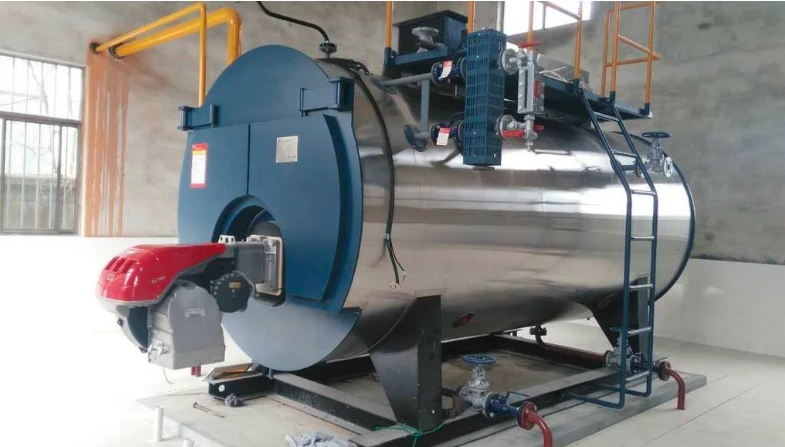
نوفمبر . 11, 2024 03:18 Back to list
Oil-Fired Steam Boiler Efficiency and Maintenance Tips for Optimal Performance
Understanding Oil-Fired Steam Boilers
Oil-fired steam boilers are integral components in various industrial and commercial applications, renowned for their efficiency and reliability. These boilers utilize oil as a fuel source to generate steam, which can be harnessed for heating, power generation, and various other applications. This article delves into the working principles, benefits, maintenance aspects, and environmental implications of oil-fired steam boilers.
Working Principles
The primary function of an oil-fired steam boiler is to convert liquid fuel into steam. This process starts with the combustion of oil in a specially designed burner. The burner atomizes the oil, allowing it to mix thoroughly with air and ignite efficiently. The generated heat from the combustion process is transferred to water in the boiler's heat exchanger or boiler tubes, leading to the production of steam.
Boilers can be classified into two main types fire-tube and water-tube. In a fire-tube boiler, the combustion gases flow through tubes surrounded by water, whereas, in a water-tube boiler, water flows through tubes heated by combustion gases. Each design has its unique advantages, but both are effective in generating steam, depending on the specific needs of the application.
Advantages of Oil-Fired Steam Boilers
1. High Efficiency Oil-fired steam boilers have high thermal efficiency. They are designed to maximize heat transfer and minimize energy losses.
2. Powerful Heat Output The ability to produce high-pressure steam makes these boilers suitable for large industrial processes such as manufacturing, refining, and heavy industries.
3. Availability of Fuel Oil is widely available and can be transported easily, making it a convenient fuel choice for many facilities, especially those located far from natural gas lines.
5. Reduced Emissions Modern oil-fired steam boilers, equipped with advanced combustion technologies, can significantly reduce harmful emissions, making them more environmentally friendly than older models.
Maintenance Considerations
oil fired steam boiler

Regular maintenance is vital to ensure the longevity and efficiency of oil-fired steam boilers. Key maintenance tasks include
- Fuel System Inspection Regular inspections of the fuel supply system help detect leaks and ensure the proper functioning of the burner.
- Cleaning Soot and scale build-up can reduce efficiency. Routine cleaning of the combustion chamber and heat exchanger surfaces is essential.
- Testing Safety Controls Regular testing of safety controls and alarms ensures safe operation and compliance with regulations.
- Water Quality Management Monitoring and treating the water quality within the boiler is crucial to prevent corrosion, scaling, and fouling, which can impair performance.
- Routine Check-ups Scheduled inspections by qualified technicians can identify potential issues before they escalate, thereby maintaining operational efficiency.
Environmental Implications
While oil-fired steam boilers have numerous advantages, they also pose environmental challenges. The combustion of oil can release greenhouse gases and other pollutants. To mitigate these impacts, advancements in technology have led to the development of cleaner-burning fuels and more efficient combustion processes. Many modern boilers are also equipped with emissions control technologies, including scrubbers and catalytic converters, to reduce harmful emissions.
Additionally, transitioning to biofuels or hybrid systems that incorporate renewable energy sources can help lower the carbon footprint of oil-fired steam boilers. Plant operators are encouraged to remain informed about regulatory changes and advancements in cleaner technologies.
Conclusion
Oil-fired steam boilers play a crucial role in various industrial sectors, offering reliable and efficient steam generation. Despite their environmental concerns, advancements in technology continue to enhance their performance while minimizing emissions. Regular maintenance and operating best practices are essential to optimize their efficiency and longevity. As industry standards evolve, the integration of cleaner fuels and technologies will further improve the sustainability of oil-fired steam boilers, ensuring that they remain a viable option in the quest for efficient steam production.
-
Best Steam Boiler Design PDF Free Design Calculation & Diagram Downloads
NewsJun.10,2025
-
Hot Boiler Water Heater Efficient Heating Solutions for Home & Commercial Use
NewsJun.10,2025
-
Steam Boiler Safety Devices High-Quality Protection Valves
NewsJun.10,2025
-
Ultimate Steam Boiler Checklist for Safety & Efficiency
NewsJun.10,2025
-
Optimal Hot Water Boiler Temperature Setting Guide
NewsJun.10,2025
-
Effective Hot Water Boiler Chemical Treatment Protect & Maintain
NewsJun.09,2025
Related PRODUCTS






















